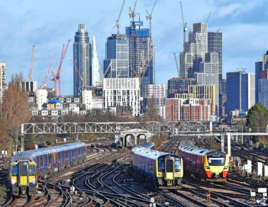Train operators have further reduced rail services, in response to surging staff sickness levels due to COVID.
The most dramatic cuts have been implemented by South Western Railway. From January 17, it reduced the timetable by nearly a third compared with before the pandemic. Both Exeter and Weymouth direct services to London were axed, with all passengers having to change trains. Other routes were reduced to hourly frequency.
The Rail Delivery Group reported that staff absence levels were at 11% in the week to January 12, little changed on the week before. Short-notice cancellations had fallen to 2.1% across all train operators (below the annual average of 3%). RDG said this indicated that the reduced timetables were providing greater reliability.
SWR said it had been running 83% of scheduled services before the new timetable, carrying 50% of pre-COVID passenger numbers. The company has indicated no end date for the emergency level of service.
All Weymouth services terminate at Bournemouth, with a shuttle service through Dorset instead. Almost all weekday Exeter services terminate at Salisbury, where passengers change trains. Services on the West of England route are reduced to two-hourly. Weekend through trains are retained.
To read the full story, see RAIL 949
















Login to comment
Comments
Martin Ash - 19/01/2022 16:41
I despair; the rail industry has a death wish..... why would anyone travel by rail with axed timetables, no food, no service, when i can jump in my car instead - I never travelled by car for work before, now I don't even consider the train with the self imposed chaos by AWC/XC et
Alexander James Ingham - 20/01/2022 15:00
Echoing my feelings, they seem to be will fully destroying the service and people’s confidence in them. It’s suicidal behaviour.
John Holt - 20/01/2022 18:59
Avanti's cuts are worse. 1 all shacks train an hour Birmingham to London. Ditto Manchester. Employers: you must come back to the office! Staff: how?
Güntürk Üstün - 23/01/2022 22:11
These are indeed very dismal developments for rail passenger traffic! Of course, no one wants to even think about that but it looks like the grumpy, stubborn and ruthless COVID-19 will continue to negatively affect rail transport business not just in the UK and mainland Europe but around the globe in 2022. Dr. Güntürk Üstün